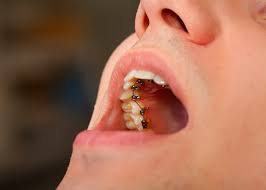Lingual Braces Treatment - Abu Dhabi - Dubai
Lingual braces are a type of orthodontic treatment that involves attaching brackets and wires to the backside of the teeth, making them less visible compared to traditional braces that are placed on the front of the teeth. Lingual braces are a popular choice for individuals who want to straighten their teeth but prefer a more discreet option.
Here are some important things to know about lingual braces treatment:
- 1. Consultation: The first step is to consult with an orthodontist who specializes in lingual braces. During the consultation, the orthodontist will examine your teeth, take X-rays, and discuss your treatment goals.
- 2. Customization: Lingual braces are customized for each individual. The orthodontist will take impressions or digital scans of your teeth to create custom brackets and wires that fit the backside of your teeth precisely.
- 3. Placement: Once the customized lingual braces are ready, the orthodontist will bond them to the back of your teeth. This process may take longer than traditional braces because of the precise placement required.
- 4. Discomfort: Initially, you may experience some discomfort or speech difficulties as your tongue adjusts to the presence of the braces. It usually takes a few weeks to adapt, and over time, these issues tend to diminish.
- 5. Treatment Duration: The treatment duration with lingual braces can vary depending on the complexity of your case and your specific treatment goals. In general, it may take a similar amount of time as traditional braces, which is typically around 18 to 36 months.
- 6. Oral Hygiene: Maintaining good oral hygiene is crucial during lingual braces treatment. Since the braces are on the back of your teeth, it can be a bit more challenging to clean them. Your orthodontist will provide instructions on how to brush and floss effectively and may recommend additional tools like interdental brushes or water flossers.
- 7. Adjustments: Like with traditional braces, you'll need periodic adjustments to tighten the wires and ensure that your teeth are gradually shifting into the desired position. These adjustments are usually scheduled every 4 to 8 weeks.
- 9. Cost: Lingual braces tend to be more expensive than traditional braces due to the customized nature of the brackets and wires. The cost can vary depending on factors such as the complexity of your case and the location of the orthodontic practice.
It's important to consult with an experienced orthodontist who can assess your specific needs and determine if lingual braces are suitable for you. They can provide detailed information about the treatment process, expected outcomes, and any other questions or concerns you may have.

